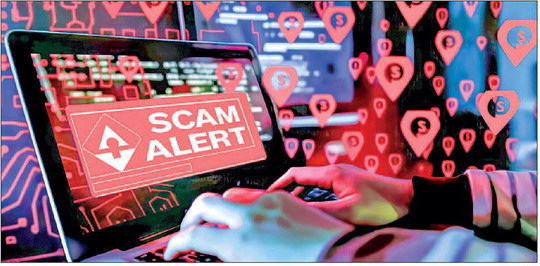Digital and in-person scams ramp up during the holidays


by Emma DiMaggio
Communications Manager
In early November, a Leisure World resident received a letter notifying her that she was the winner of a $2.6 million grand prize courtesy of Publishers Clearing House.
The letter congratulated her for her substantial winnings and urged her to call her “claims agent,” a mysterious Joe Johnson who would help her pay for “insurance” on her winnings: a $4,000 charge.
The problem: She didn’t recall signing up for any grand prize drawings. The letter didn’t include any personal information about her either, addressing her only as “Dear Winner.” And she’d never heard of someone having to pay money to claim their winnings.
The woman brought the letter to GRF Security Director Victor Rocha, who quickly confirmed her suspicion: the congratulatory letter was a scam, and it wasn’t the first one he’d seen.
Scammers want their victims to get caught up in the excitement of a lifechanging prize, so caught up that they call the number listed on the letter. The person on the other end of the line will then use a variety of manipulation tactics to convince the supposed winner to transfer large sums of cash, in the thousands or tens of thousands of dollars, in order to claim their prize.
By the time that the bank transfer has gone through, it’s often too late to get the money back. Scams like these and many others ramp up during the holiday season.
Here are a few scams to look out for:
• Package Delivery Scams: During the holiday season, people order more packages than usual. Knowing this, scammers will sending phishing emails and text messages pretending to be from companies like FedEx, UPS and Amazon. Often they will attempt to “notify” people that they’ve missed a package delivery, or that the address information provided is not correct. These phishing messages often include links to websites that will ask for personal information, which scammers will use to get money or information out of their victims. During the holidays, people should pay extra at-
SCAMS, page 5
Scammers rely on heightened emotions- especially excitement and fear-to prevent people from thinking rationally.
from)page)1
tention to delivery notifications and email updates, and refrain from clicking any links from addresses or phone numbers they do not recognize. UPS and FedEx will never ask for personal information via email.
• Too-Good-To-Be-True Deals: There may appear to be deals galore over the holidays, especially on social media. Make sure to read reviews and research unfamiliar retailers. Use a credit card for online payments and keep the receipt in case an issue arises. If a seller asks to be paid by Zelle, Cash App, or another similar app, be wary. Once the money is sent, it’s gone.
• Baby Formula Scam: In this recently popularized scam, women, often accompanied by a child, will approach people in grocery stores asking them to buy them baby formula, insisting they cannot afford it. Feeling sympathy, the victim purchases the baby formula, which is usually quite expensive. The scammer will then get the receipt and return the formula for cash. If they are not able to get the receipt, they sell the formula, which is in high demand.




